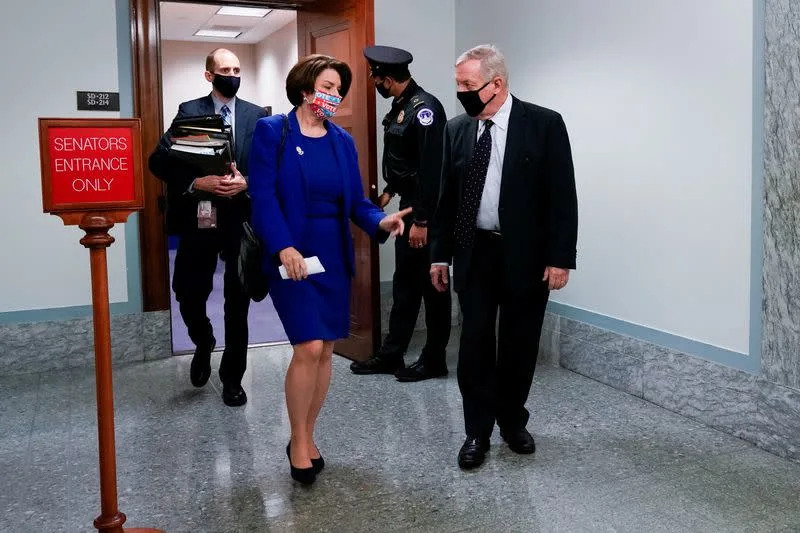Reuters
Explainer-What is Congress doing to strengthen U.S. election laws?
David Morgan – February 1, 2022

FILE PHOTO: U.S. Senator Amy Klobuchar (D-MN) speaks to reporters after a Senate Democrats caucus meeting on Capitol Hill in Washington



FILE PHOTO: Committee Chairman Senator Dick Durbin, a Democrat from Illinois, delivers opening remarks as Merrick Garland, U.S. attorney general, testifies before a Senate Judiciary Committee hearing in Washington
WASHINGTON (Reuters) – Democrats and Republicans in the U.S. Senate hope to prevent a repeat of the deadly Jan. 6 Capitol riot by reforming a 135-year-old election law laying out the roles that Congress and the vice president play in certifying presidential election results.
Democratic Senators Amy Klobuchar and Dick Durbin and independent Angus King, who caucuses with the Democrats, released a proposal on Tuesday.
A separate bipartisan group led by Republican Susan Collins is also working on the issue and is expected to meet later this week.
WHAT HAS CONGRESS DONE ON ELECTION REFORM UP TO NOW?
Democrats have pushed to strengthen voting rights in response to a wave of voting restrictions passed in Republican-led states following Republican President Donald Trump’s false claim that the 2020 election was stolen from him. Republicans opposed that effort as a power grab that undercut state and local control of elections, and the effort ran aground in the Senate last month.
However, Republicans have been more open to tightening the way the United States counts votes once they are cast.
WHY IS REFORM NEEDED?
Lawmakers want to clarify the 1887 Electoral Count Act so that Congress would have a harder time blocking the certification of elections and to make it clear that vice presidents cannot overturn them.
The law was used as a pretext for another false Trump claim that his vice president, Mike Pence, had the authority to overturn the 2020 election of Democrat Joe Biden. Pence concluded that he did not have that power, much to Trump’s frustration.
As Congress worked to certify the election results on Jan. 6, 2021, Trump criticized Pence at a rally near the White House for disagreeing with him and urged supporters to march to the Capitol. Thousands then stormed the Capitol in the worst assault on Congress since the War of 1812.
Trump was impeached in the House of Representatives but acquitted in the Senate on a charge of inciting the assault.
Since then, the former president has criticized Pence repeatedly for failing to interfere with the vote count.
WHAT ARE DEMOCRATS PROPOSING?
The Democrats’ draft legislation would make it clear that the vice president has no power to resolve disputes over electors or to determine the validity of electors or their votes.
It would limit the circumstances under which members of Congress can object to election results. It would require one-third of the House and Senate to sign an objection in order for it to be considered, and three-fifths of both chambers to vote to support an objection.
Currently, an objection must be signed by only one senator and one House member to be considered separately by each chamber. To succeed, an objection must then be agreed to by simple majorities in both the House and Senate. In 2021, Republicans objected to election results from Arizona and Pennsylvania. Eight senators and 139 House members — all Republicans — later voted to support either or both.
The proposal would establish Election Day in November as the time for choosing presidential electors and prohibit states from choosing electors on any other day — a response to the Trump campaign’s attempts to round up alternate electors in the weeks after the 2020 vote.
It also sets a Dec. 20 deadline for states to resolve controversies or contests involving an election outcome.
WHAT IS THE COLLINS GROUP CONSIDERING?
The Collins-led group of Democrats and Republicans is looking at similar reforms. But it is also weighing federal penalties for anyone who threatens an election official or a poll worker, protections from unwarranted removal from office for election officials, stronger election security measures and election management improvements.
WHERE COULD THINGS GO FROM HERE?
The involvement of Klobuchar, the Senate Rules Committee chair, and Durbin, the Senate’s No. 2 Democrat, is seen as a sign that Democratic leaders support the effort.
The White House has also said it is open to reform efforts but does not view them as a replacement for the more sweeping voting rights legislation that failed to win approval in the Senate.
The Collins group has drawn tentative interest from Senate Minority Leader Mitch McConnell.
Some lawmakers and aides say there is a chance that elements of the two initiatives could be incorporated into a single piece of legislation that can draw enough support to win 60 votes, a threshold for most legislation to advance in the 100-seat chamber.
(Reporting by David Morgan; editing by Andy Sullivan and Jonathan Oatis)
